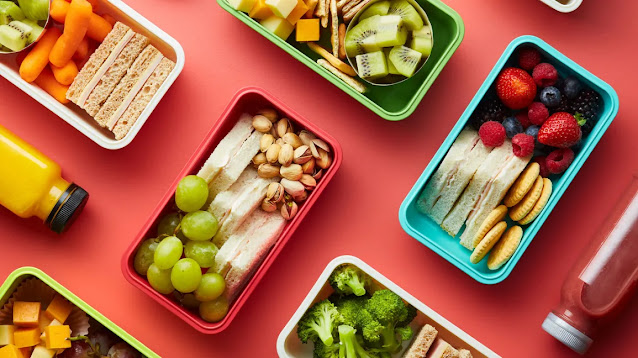Introduction:
Nightmares, characterized by distressing and vivid dreams during sleep, can have a significant impact on one's well-being and overall sleep quality.
While various factors contribute to the occurrence of nightmares, including stress and psychological factors, emerging research suggests that dietary choices may play a role as well.
This article explores the relationship between food consumption and nightmares, providing insights into foods that can potentially alleviate or aggravate this nocturnal phenomenon.
I. Understanding Nightmares:
Before delving into dietary interventions, it is essential to comprehend the nature of nightmares.
Nightmares typically occur during the rapid eye movement (REM) phase of sleep and are often associated with negative emotions, fear, and anxiety upon waking. Their occurrence may stem from psychological distress, trauma, or other underlying factors.
II. The Role of Diet in Nightmares:
While research on the direct impact of diet on nightmares is limited, certain foods and eating patterns have been observed to influence sleep quality and, by extension, nightmares.
By making informed dietary choices, individuals may potentially reduce the frequency and intensity of nightmares.
III. Beneficial Foods:
a. Complex Carbohydrates: Including whole grains, legumes, and vegetables in your diet can promote stable blood sugar levels, thus potentially reducing nightmares associated with hypoglycemia or fluctuations in glucose levels.
b. Tryptophan-Rich Foods: Foods such as turkey, chicken, fish, dairy products, nuts, and seeds are rich in tryptophan, an amino acid precursor to serotonin, a neurotransmitter that helps regulate mood and sleep.
c. Magnesium-Rich Foods: Magnesium, found in leafy greens, nuts, seeds, and whole grains, is known to support relaxation and enhance sleep quality, potentially aiding in nightmare prevention.
d. Herbal Teas: Chamomile and peppermint teas, known for their calming properties, can contribute to a more relaxed state before bedtime, potentially reducing the occurrence of nightmares.
IV. Foods to Avoid:
a. High-Fat Foods: Consuming fatty and greasy foods close to bedtime can lead to indigestion, disrupting sleep and potentially triggering nightmares.
b. Caffeine and Stimulants: Substances such as coffee, tea, energy drinks, and chocolate contain caffeine and other stimulants that can interfere with sleep patterns, increasing the likelihood of nightmares.
c. Spicy Foods: Spices, especially when consumed in excess, may cause heartburn or acid reflux, which can disrupt sleep and potentially contribute to nightmares.
d. Alcohol: While alcohol initially induces drowsiness, it can disrupt the natural sleep cycle, leading to fragmented sleep and an increased likelihood of nightmares.
V. Additional Considerations:
a. Balanced Diet: Adopting a well-balanced diet that includes a variety of nutrients can optimize overall health and indirectly contribute to better sleep quality.
b. Hydration: Staying adequately hydrated throughout the day can support optimal bodily functions, including sleep.
c. Mindful Eating: Practicing mindful eating, which involves paying attention to food choices, eating patterns, and portion sizes, can enhance overall well-being and potentially improve sleep quality.
VI. Healthy Sleep Hygiene Practices:
In addition to dietary considerations, adopting healthy sleep hygiene practices can significantly contribute to minimizing nightmares and improving overall sleep quality. Consider the following suggestions:
a. Establish a Consistent Sleep Routine: Going to bed and waking up at the same time each day helps regulate the body's internal clock, promoting better sleep patterns and potentially reducing the occurrence of nightmares.
b. Create a Relaxing Bedtime Routine: Engage in activities that promote relaxation before bed, such as reading a book, taking a warm bath, or practicing gentle stretching exercises. These routines can help signal to the body that it's time to unwind and prepare for sleep.
c. Create a Sleep-Friendly Environment: Ensure that your sleep environment is conducive to restful sleep. Keep the bedroom cool, dark, and quiet, and consider using comfortable bedding and supportive pillows to enhance comfort.
d. Limit Exposure to Electronic Devices: The blue light emitted by electronic devices, such as smartphones, tablets, and laptops, can interfere with the body's natural sleep-wake cycle.
Minimize exposure to these devices before bed to promote a more relaxed state conducive to better sleep.
e. Manage Stress Levels:
High levels of stress and anxiety can contribute to the occurrence of nightmares. Implement stress management techniques such as meditation, deep breathing exercises, or engaging in hobbies and activities that promote relaxation and reduce stress levels.
f. Regular Exercise:
Engaging in regular physical activity during the day can promote better sleep quality at night. However, avoid exercising close to bedtime, as it may stimulate the body and make it more difficult to fall asleep peacefully.
g. Seek Professional Help if Needed: If nightmares persist despite implementing dietary changes and sleep hygiene practices, it is advisable to consult with a healthcare professional or a sleep specialist who can provide personalized guidance and support.
Conclusion:
By incorporating dietary strategies, practicing healthy sleep hygiene, and adopting a holistic approach to sleep health, individuals can take proactive steps to minimize nightmares and enhance their overall sleep quality.
While the impact of diet on nightmares is still an area of ongoing research, making informed food choices, avoiding potential triggers, and implementing healthy lifestyle practices can contribute to a restful and rejuvenating sleep experience.
Remember that individual experiences may vary, and consulting with a healthcare professional is recommended for personalized advice and guidance.






























